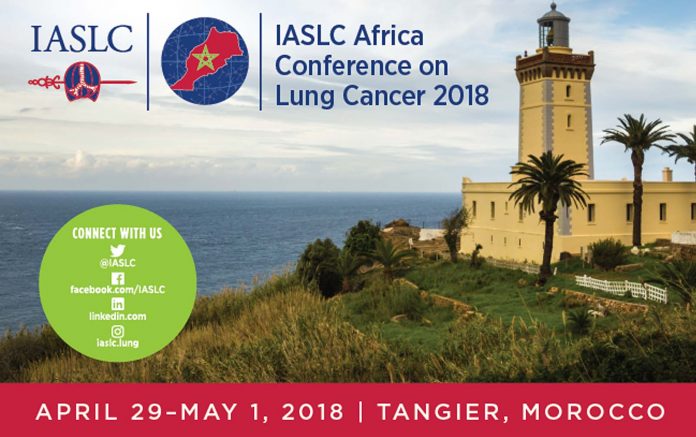New collaborative meeting to provide educational, scientific updates to diverse audience from Africa and the Middle East.
By Joy Curzio, ILCN Managing Editor
Posted: February 2018
As a global association, the IASLC understands the numerous variables, experiences, and perspectives that dictate a country’s or region’s ability to be a principal actor in scientific events. For many years, several countries in Africa have had fewer opportunities for international education, leading to diminished awareness of the problems those countries face and little to no discussion of potential solutions. For these reasons, the IASLC is sponsoring its first major educational event in Tangier, Morocco, April 29-May 1, 2018. The endeavor is led by the IASLC President Giorgio V. Scagliotti, MD, and Co-Chairs Prof. Abdelaziz Maaouni, Fred R. Hirsch, MD, PhD, and David P. Carbone, MD, PhD. The Scientific Committee Chair Federico Cappuzzo, MD, and the Educational and IASLC School of Oncology Chair Christian Rolfo, MD, PhD, MBA, are working in collaboration with local and honorary committees coordinated by Nabil Ismaili, MD, and Fadila Guessous, PhD. The aim of the conference is to provide all African regions, including the Middle East and northern parts of the continent, with guidance— based on diverse international perspectives— regarding management of lung cancers, mesothelioma, and thymic and other thoracic malignancies.
It was after presenting at several conferences in the Middle East and North Africa that Dr. Carbone noted that “there was a large group of enthusiastic young cancer physicians with limited ability to interact with global experts, limited ability to travel, and limited involvement with the international community represented by the IASLC.” It was then that he proposed the idea for this meeting to the IASLC Board of Directors, which enthusiastically approved.
“I am excited about the opportunity to interact with dedicated and talented physicians in a region of the world new to the IASLC, and to work with these physicians to improve the quality and duration of life for their patients, as well as to provide opportunities for them to participate in global research efforts,” Dr. Carbone said.
The IASLC CEO Dr. Hirsch noted that this specific meeting was in the planning stages for 1 to 2 years, but that provision of educational programs and scientific updates in this specific geographic region has been a long-standing goal of the association. In addition to the numerous clinical differences, there are also cultural differences that the IASLC is working to understand so that information is delivered clearly and concisely. “Bringing such a diverse group together is going to be interesting,” Dr. Hirsch said. “Hopefully we will be able to harmonize the educational offerings to best support attendees.”
We would like this meeting to be a networking forum for attendees to discuss and find parallels among the different realities in the African countries and Middle Eastern region.
–Christian Rolfo, MD, PhD, MBA
The first day of the congress will include an update in general concepts for the different multidisciplinary specialties involved in thoracic oncology including, but not limited to, radiology, oncology, pathology, and pulmonology. A simultaneous session held by the IASLC School of Nursing Thoracic Oncology—the first event of its kind—will focus on the roles of Thoracic Nurse Navigators and research nurses in lung cancer, and will highlight possibilities for implementation of these types of approaches in Africa. Subsequent sessions will address general multidisciplinary updates, including patient advocacy and palliative care. In addition, there will be discussion of improved care coordination among African countries through the use of a cancer registry, providing specific successful case examples of the Middle East and Latin America regions.
“We hope the attendees leave the conference with clear messages about standardof- care treatments, with tools to increase the homogenization of the treatment among the different countries, and with new information about the advances in thoracic oncology treatment, diagnosis, and prevention,” Prof. Rolfo said. “We would like this meeting to be a networking forum for attendees to discuss and find parallels among the different realities in the African countries and Middle Eastern region.”
Presentation formats will include didactic lectures and roundtable forums; the latter will focus on general themes such as molecular pathology, treatment of advanced disease, toxicity management, and pharmaco-economics. One of the most important roundtables will be on smoking cessation and control in the general population and the negative public influence of the tobacco industry.
“Scientific societies should make investments to allow African institutions to get progressively close to the essentials of diagnosis and treatment of thoracic malignancies,” the IASLC President Dr. Scagliotti said. “More relevantly, the IASLC should be at the forefront of any initiative to promote tobacco control and early detection of lung cancer.”
Prof. Rolfo hopes that this inaugural meeting’s success will solidify its spot on the IASLC’s calendar for many years to come. Look for post-meeting recaps in the August issue of Lung Cancer News. ✦











